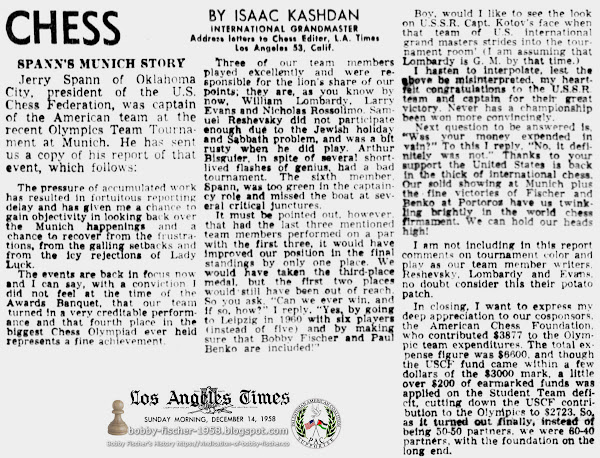The Los Angeles Times, Los Angeles, California, Sunday, December 14, 1958
Spann's Munich Story
Jerry Spann of Oklahoma City, president of the U.S. Chess Federation, was captain of the American team at the recent Olympics Team Tournament at Munich. He has sent us a copy of his report of that event, which follows.
The pressure of accumulated work has resulted in fortuitous reporting delay and has given me a chance to gain objectivity in looking back over the Munich happenings and a chance to recover from the frustrations, from the galling setbacks and from the icy rejections of Lady Luck.
The events are back in focus now and I can say, with a conviction, I did not feel at the time of the Awards Banquet, that our team turned in a very creditable performance and that fourth place in the biggest Chess Olympiad ever held represents a fine achievement.
Three of our team members played excellently and were responsible for the lion's share of our points; they are, as you know by now, William Lombardy, Larry Evans and Nicholas Rossolimo, Samuel Reshevsky did not participate enough due to the Jewish holiday and Sabbath problem, and was a bit rusty when he did play. Arthur Bisguier, in spite of several short lived flashes of genius, had a bad tournament. The sixth member, Spann, was too green in the captaincy role and missed the boat at several critical junctures.
It must be pointed out, however, that had the last three mentioned team members performed on a par with the first three, it would have improved our position in the final standings by one place. We would have taken the third place medal, but the first two places would still have been out of reach. So you ask, “Can we ever win, and if so, how?” I reply, “Yes, by going to Leipzig in 1960 with six players (instead of five) and by making sure that Bobby Fischer and Paul Benko are included!”
Boy, would I like to see the look on U.S.S.R. Capt. Kotov's face when that team of U.S. international grand masters strides into the tournament room! (I am assuming that Lombardy is G. M. by that time).
I hasten to interpolate, lest the above be misinterpreted, by heartfelt congratulations to the U.S.S.R. team and captain for their great victory. Never has a championship been won more convincingly.
Next question to be answered is, “Was your money expended in vain?” To this I reply, “No, it definitely was not.” Thanks to your support the United States is back in the thick of international chess. Our solid showing at Munich plus the fine victories of Fischer and Benko at Portoroz have us twinkling brightly in the world chess firmament. We can hold our heads high!
I am not including in this report comments on tournament color and play as our team member writers, Reshevsky, Lombardy and Evans, no doubt consider this their potato patch.
In closing, I want to express my deep appreciation to our cosponsors, the American Chess Foundation, who contributed $3877 to the Olympic team expenditures. The total expense figure was $6600, and though the USCF fund came within a few dollars of the $3000 mark, a little over $200 of earmarked funds was applied on the Student Team deficit, cutting down the USCF contribution to the Olympics to $2723. So, as it turned out finally, instead of being 50-50 partners, we were 60-40 partners, with the foundation on the long end.
I find myself somewhat miffed that Isaac Kashdan chose to publish a story which omits Spann's bold criticism of Soviet' rampant Judeophobic discrimination against Samuel Reshevsky.
- Pittsburgh Sun-Telegraph Pittsburgh, Pennsylvania Saturday, October 18, 1958, Soviet, U.S. Teams Draw 1st Round of Chess Olympics
- The Norman Transcript, Norman, Oklahoma, Sunday, November 09, 1958, The Plot That Backfired
- The Daily Oklahoman Oklahoma City, Oklahoma Sunday, November 23, 1958, Checkmated at the Chess Table























